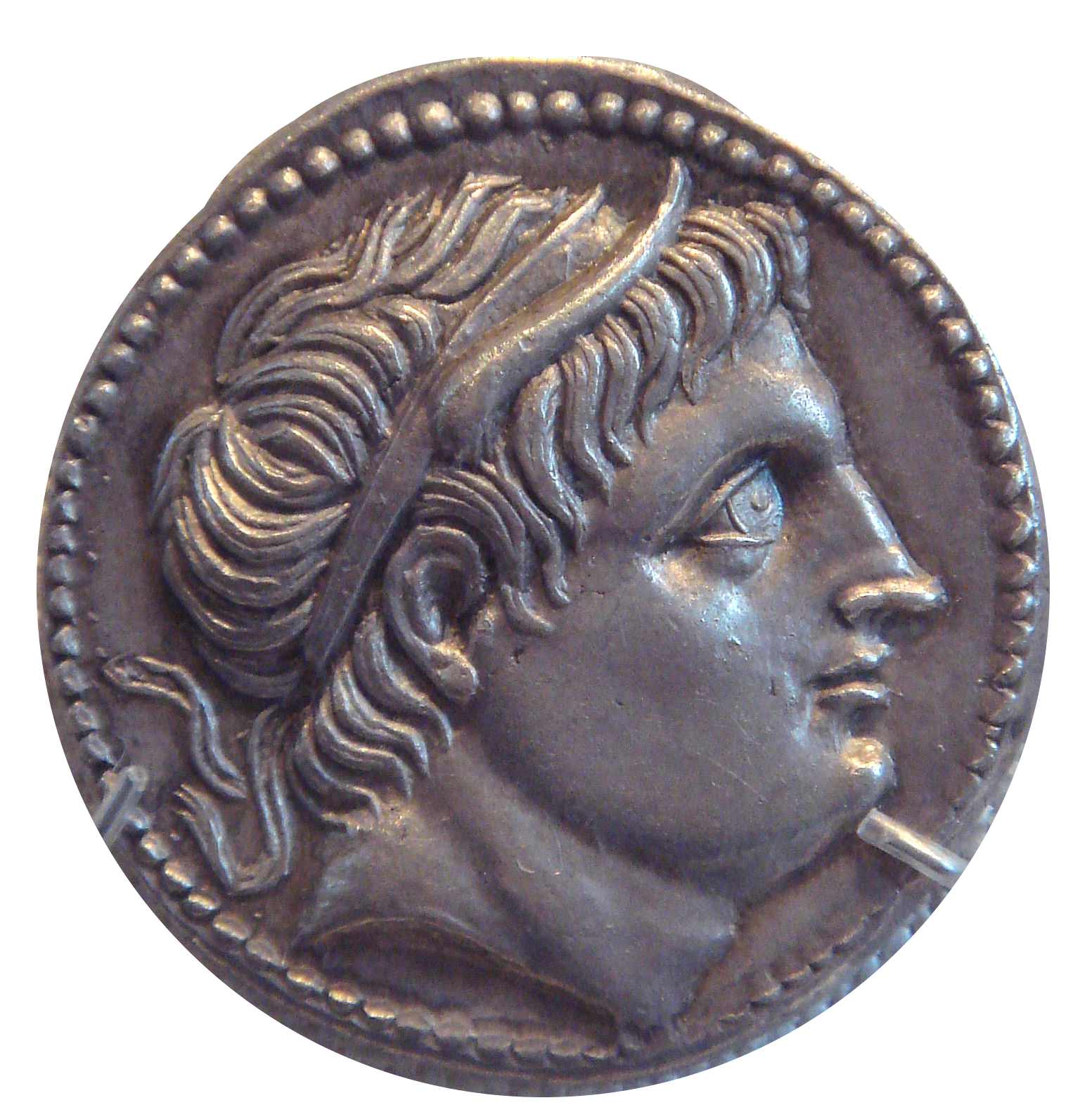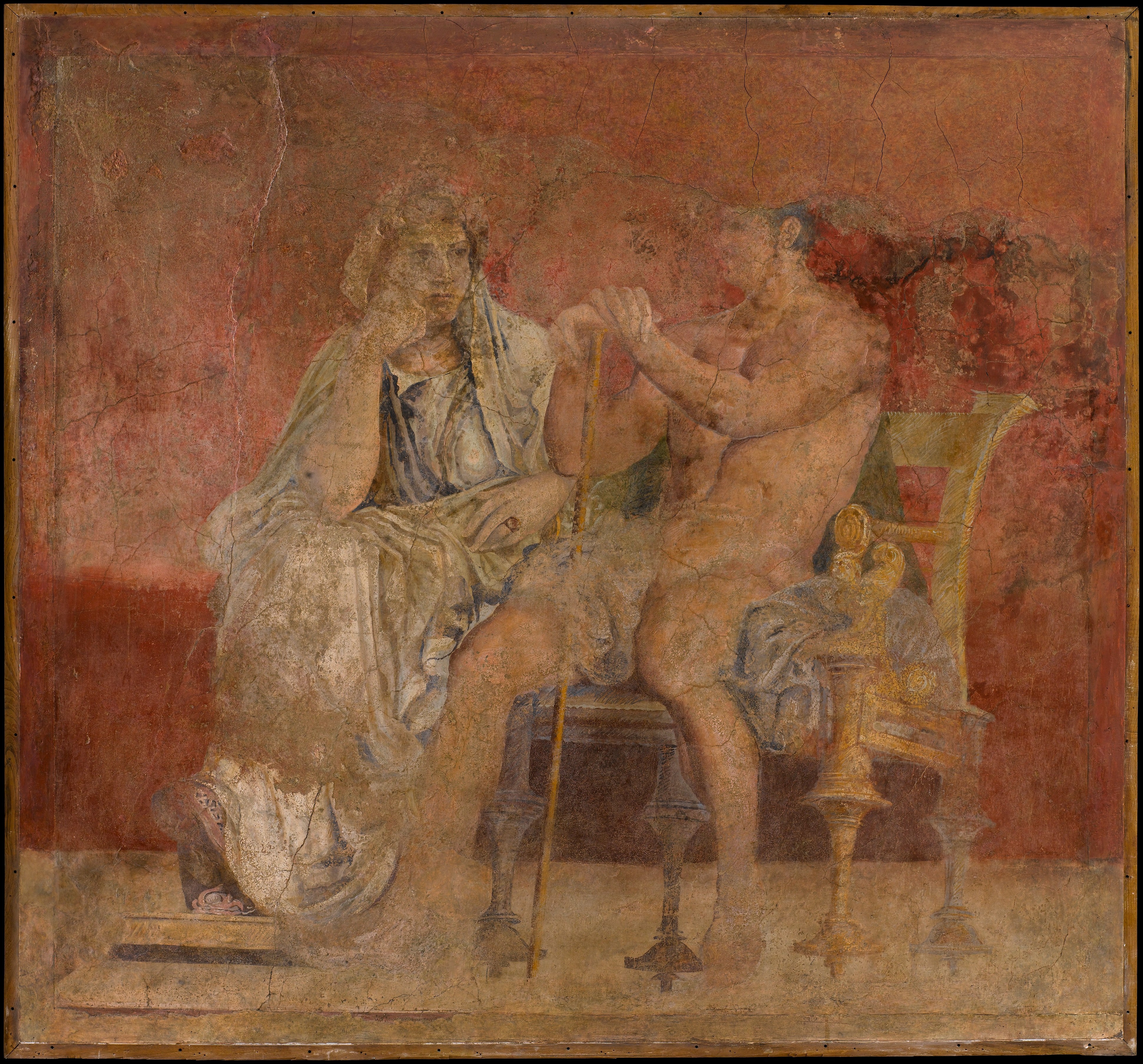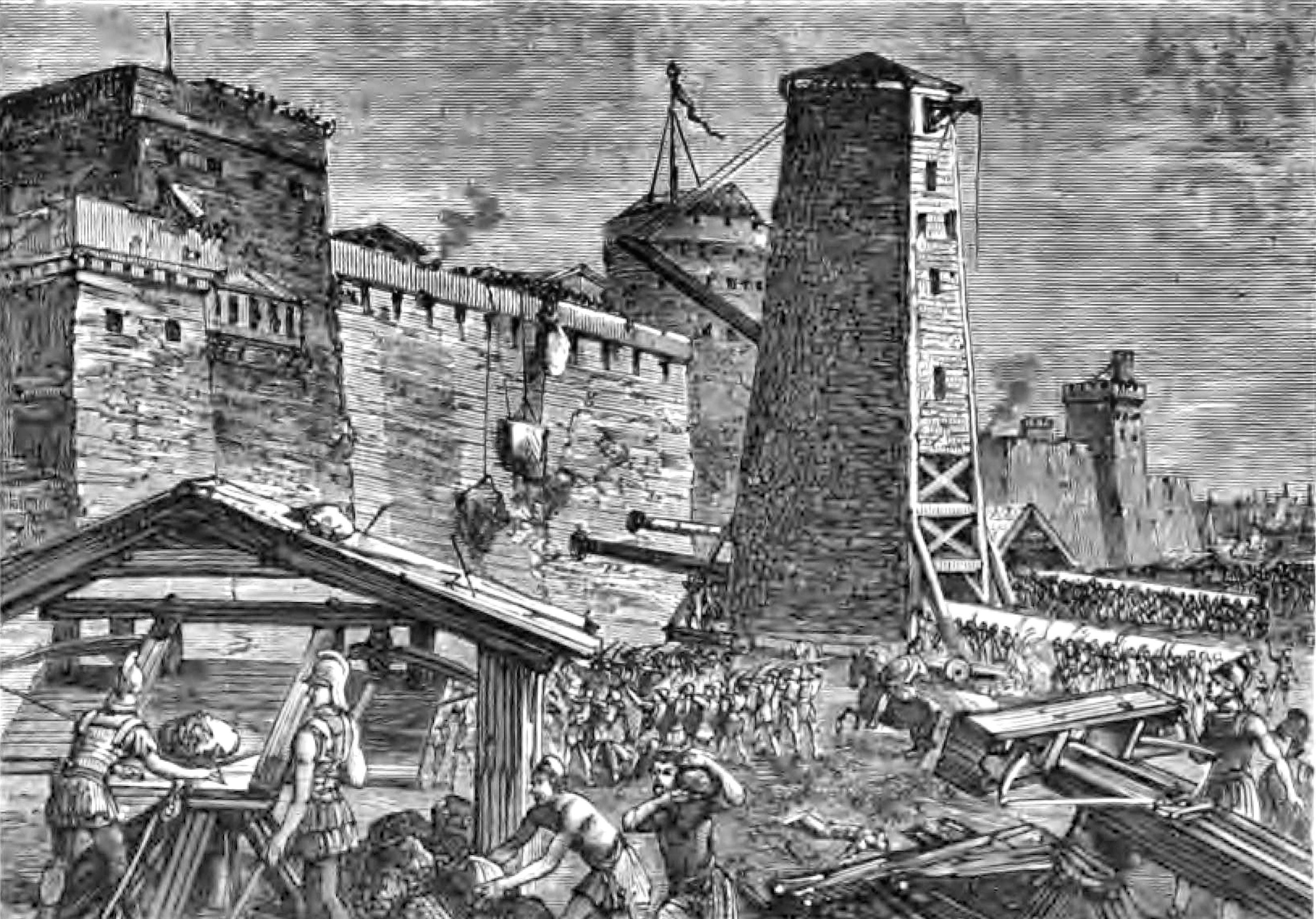1. Biography
Demetrius I Poliorcetes was a prominent figure in the tumultuous period following the death of Alexander the Great, known as the Diadochi Wars. His life was marked by military campaigns, political maneuvering, and a constant struggle to establish and maintain power.
1.1. Early life and education
Demetrius was born around 337 BC, the son of Antigonus I Monophthalmus ("the One-Eyed"), a high-ranking Macedonian general and one of Alexander the Great's most trusted companions, and his wife Stratonice. He also had a younger brother named Philippos, who later became a general. Some historians, including Plutarch, speculate that Demetrius might have been Antigonus's nephew, adopted after the early death of Antigonus's own son.
Antigonus belonged to an influential family from Elimiotis in western Macedon and was a close confidant of Philip II of Macedon. Demetrius was born in the same year that King Philip II was assassinated. His father participated in Alexander the Great's Persian campaign and was appointed governor of Phrygia, Lycia, and Pamphylia (in modern-day western Turkey) after the Battle of the Granicus in 334 BC. This position gave Antigonus control over crucial supply routes between Europe and Asia. Little is known about Demetrius's childhood, but it is believed he grew up in Celaenae, his father's residence in Asia.
After Alexander's death in Babylon in 323 BC, Antigonus became a major rival of the regent Perdiccas. Antigonus allied with Antipater and Ptolemy I in the First Diadochi War against Perdiccas. Following Perdiccas's assassination in 320 BC, Antigonus gained significant advantages from the subsequent Triparadeisos conference. The new regent, Antipater, appointed him Commander-in-Chief of the army in Asia and confirmed his governorship. The close relationship between Antipater and Antigonus was further solidified when Demetrius married Phila, Antipater's daughter and the widow of Craterus.
1.2. Early military career
Demetrius served alongside his father, Antigonus I Monophthalmus, throughout the Second War of the Diadochi. He commanded the cavalry on the right flank at the Battle of Paraitakene in 317 BC. Despite heavy losses to the Antigonid center and the routing of the left flank, Demetrius's success on the right prevented a complete defeat. He was also present at the decisive Battle of Gabiene. Immediately after the battle, while Antigonus held the betrayed Eumenes, Demetrius was among the few who urged his father to spare Eumenes's life.
At the age of 21, Demetrius was tasked by his father with defending Syria against Ptolemy, the son of Lagus. He suffered a significant defeat at the Battle of Gaza in 312 BC. However, he partially redeemed this loss with a victory at the Battle of Myus against Cilles, one of Ptolemy's generals. In the spring of 310 BC, Demetrius was soundly defeated when he attempted to expel Seleucus I Nicator from Babylon. His father also suffered a defeat in the autumn of the same year. As a result of this Babylonian War, Antigonus lost nearly two-thirds of his empire, with all eastern satrapies falling under Seleucus's control.
2. Major activities and achievements
Demetrius's career was defined by a series of ambitious military campaigns and political maneuvers that shaped the Hellenistic world. He was known for his innovative military strategies and his significant, albeit controversial, impact on the political landscape of his time.
2.1. Liberation of Greece and role in Athens
After several campaigns against Ptolemy along the coasts of Cilicia and Cyprus, Demetrius sailed with a fleet of 250 ships to Athens. In 307 BC, he successfully liberated the city from the control of Cassander and Ptolemy, expelling the garrison stationed there under Demetrius of Phalerum, and then besieged and captured Munychia. These victories led the Athenians to worship him as a tutelary deity under the title of Soter (ΣωτήρGreek, Modern, "Saviour").

In 304 BC, Demetrius returned to Greece a second time as a liberator, reinstating the Corinthian League. However, his subsequent actions and personal conduct quickly eroded the goodwill he had earned. His licentiousness and extravagance made the Athenians regret his presence and long for the government of Cassander. Among his notable outrages, he pursued a young man named Democles the Handsome, who, to avoid Demetrius's advances, jumped into a cauldron of hot water, dying to preserve his honor and that of his city. In another instance, Demetrius waived a fine of 50 talents imposed on a citizen in exchange for the favors of the man's son, Cleaenetus. He also sought the attention of Lamia, a Greek courtesan, demanding 250 talents from the Athenians, which he then gave to Lamia and other courtesans to purchase soap and cosmetics, reportedly by imposing a tax on soap.
After Athens' capitulation in 294 BC, Demetrius established a new government that significantly altered traditional democratic forms, which his opponents viewed as an oligarchy. The cyclical rotation of the secretaries of the Council and the election of archons by allotment were both abolished. Between 294/3 and 293/2 BC, two of Athens' most prominent citizens, Olympiordoros and Phillipides of Paiania, were appointed by the Macedonian king, a move that Plutarch suggests was made to install archons "most acceptable to the Demos." These actions highlight Demetrius's tendency to centralize power and undermine democratic institutions, despite his initial role as a liberator.
2.3. Reign as King of Macedonia
In 294 BC, Demetrius gained possession of Athens after a protracted blockade, pardoning the inhabitants for their previous misconduct in 301 BC, a display of mercy he valued in a ruler. In the same year, he secured the throne of Macedonia by murdering Alexander V, the son of Cassander. He faced a rebellion from the Boeotians but secured the region after capturing Thebes in 291 BC. That year, he married Lanassa, the former wife of Pyrrhus.

However, his position as ruler of Macedonia was continually threatened by Pyrrhus, who exploited Demetrius's occasional absences to ravage the undefended parts of his kingdom. Eventually, the combined forces of Pyrrhus, Ptolemy, and Lysimachus, aided by disaffected Macedonian subjects, compelled Demetrius to abandon Macedonia in 288 BC.
After an unsuccessful siege of Athens, Demetrius moved into Asia and attacked some of Lysimachus's provinces with varying success. Famine and pestilence decimated the greater part of his army, leading him to seek support and assistance from Seleucus. However, hostilities broke out before he reached Syria, and after gaining some initial advantages over his son-in-law, Demetrius was completely abandoned by his troops on the battlefield and surrendered to Seleucus.
3. Military innovations and engineering
Demetrius I Poliorcetes was a pivotal figure in the evolution of military technology and strategy during the Hellenistic period, particularly in the field of poliorcetics, or siege warfare. His contributions extended beyond mere tactical prowess to include significant innovations in military engineering and logistics.
Demetrius was deeply involved in innovations in siegecraft. While not all of his sieges were successful, such as the famous siege of Rhodes, he left an indelible mark on the history of global siege warfare. He notably scaled up and standardized the innovations introduced by Alexander the Great, leading to the widespread use of massive siege engines in Hellenistic armies. For instance, he developed a battering ram 180 ft long, requiring 1,000 men to operate, and the formidable wheeled siege tower "Helepolis" (Taker of Cities), which stood 125 ft tall, 60 ft wide, and weighed 360.00 K lb (360.00 K lb).
Beyond the development of individual machines, Demetrius was an exceptional logistician, capable of sustaining sieges on an unprecedented scale. He established effective logistical procedures to support these large-scale operations. He was also a pioneer in amphibious warfare, frequently conducting sieges from both sea and land. His siege warfare strategy has sometimes been described as a "blitzkrieg" due to its rapid pace of execution. During his campaigns in Greece (304-303 BC and 294-291 BC), he rapidly captured cities one after another in a matter of months, including Panactum, Phyle, Kechries, Epidaurus, Sicyon, Corinth, Bura, Scirus (Arcadia), Argos, and Orchomenus. Plutarch claimed Demetrius commanded 110,000 soldiers in 288 BC, a figure likely exaggerated but indicative of his capacity to assemble and manage some of the largest armies of the era.
Demetrius also distinguished himself as an important military engineer and fortifier of cities. He devised effective strategies and developed new methods for defensive siege warfare. For example, after his first capture of Athens in 307-306 BC, he undertook one of the most significant fortification projects in the city's history. In 303 BC, after capturing Sicyon and recognizing its defensive weaknesses, he decided to completely relocate the city to a more defensible position and, according to Plutarch, personally oversaw the construction of the new city. Archaeological discoveries related to the urbanization of Corinth during that period also suggest substantial fortification work initiated by Demetrius after his conquest of the city. These projects underscore his influence on both offensive and defensive military engineering, painting a picture of him as a "builder king" in addition to a "besieger."
4. Personal life and family
Demetrius I Poliorcetes's personal life was as eventful and complex as his military and political career, marked by multiple marriages, significant relationships, and a large family that played a role in the dynastic struggles of the Hellenistic age.
4.1. Marriages and Children
Demetrius was married five times. His first wife was Phila, daughter of Regent Antipater, by whom he had two children: his daughter Stratonice of Syria and his son Antigonus II Gonatas.
His second wife was Eurydice of Athens, an Athenian noblewoman, who was the widow of Ophellas, Ptolemy's governor of Cyrene. By Eurydice, Demetrius had a son named Corrhabus.
His third wife was Deidamia, a sister of Pyrrhus of Epirus. Deidamia bore him a son named Alexander, who is said by Plutarch to have spent his life in Egypt, probably in an honorable captivity.
His fourth wife was Lanassa, the former wife of his brother-in-law Pyrrhus of Epirus.
His fifth wife was Ptolemais, daughter of Ptolemy I Soter and Eurydice of Egypt. With Ptolemais, he had a son named Demetrius the Fair, who later became King of Cyrene and was the father of Antigonus III Doson.
Additionally, Demetrius had a relationship with a celebrated Greek courtesan named Lamia of Athens, by whom he had a daughter also named Phila.
4.2. Personality and evaluation
Demetrius was described as a man of considerable talent and charisma. He was renowned for his handsome appearance, bravery, and loyalty to his friends. However, these positive traits were often overshadowed by his more problematic characteristics. He was known for being licentious, ostentatious, and arrogant.
Plutarch, in his biography of Demetrius, famously pairs him with the Roman general Mark Antony, drawing parallels between their lives. Both men were described as having strong passions, a love for drink, and a penchant for warfare. They were characterized by their generosity and extravagance, experiencing dramatic fluctuations in fortune, from the pinnacle of prosperity to sudden downfall, only to recover their power quickly. Demetrius's pursuit of young men, such as Democles the Handsome, and his financial demands on the Athenians to support his courtesan Lamia, exemplify the licentiousness and disregard for public sentiment that often undermined his political standing. His actions, such as abolishing traditional democratic forms in Athens and imposing heavy taxes, reflect a ruler who prioritized his own power and desires over the well-being and democratic principles of the populace, leading to significant criticism from his contemporaries and historians alike.
5. Death
After his surrender to Seleucus, Demetrius's son, Antigonus II Gonatas, offered all his possessions and even his own person to secure his father's liberty, but these efforts proved futile. Seleucus, fearing Demetrius's influence and potential for resurgence, kept him confined. Demetrius died in captivity in 283 BC, at the age of 53 or 54, after a confinement of three years. He passed away in Cilicia, possibly in Apameia.
His remains were eventually handed over to his son Antigonus, who honored him with a splendid funeral at Corinth. Demetrius's descendants continued to hold the Macedonian throne until the time of Perseus, when Macedon was conquered by the Romans in 168 BC.
6. Legacy and evaluation
Demetrius I Poliorcetes left a multifaceted legacy, primarily remembered for his military genius and his significant, though often controversial, impact on the political landscape of the Hellenistic world.
6.1. Military legacy
Demetrius proved to be an exceptionally effective commander throughout his 30-year military career, from the Battle of Paraitakene in 317 BC until his final defeat. He notably built upon and significantly scaled up the military innovations introduced by Alexander the Great, standardizing the widespread use of massive siege engines in Hellenistic warfare. His contributions to siegecraft were so profound that he earned his famous epithet, "Poliorcetes" (the Besieger).
![Coin of Demetrius I; Greek inscription reads ΒΑΣΙΛΕΩΣ ΔΗΜΗΤΡΙΟΥ ([coin] of King Demetrius).](https://cdn.onul.works/wiki/source/1950240935e_06a0df41.jpg)
Beyond his technological advancements, Demetrius was an excellent logistician, capable of maintaining sieges on scales previously unheard of. He also pioneered amphibious warfare, frequently conducting sieges from both sea and land. His campaigns were often characterized by a rapid, almost "blitzkrieg" strategy, allowing him to capture numerous cities in quick succession, such as Panactum, Phyle, Kechries, Epidaurus, Sicyon, Corinth, Bura, Scirus (Arcadia), Argos, and Orchomenus during his Greek campaigns. Although the reported figure of 110,000 soldiers under his command in 288 BC is likely an exaggeration by ancient authors, it underscores his ability to assemble and lead some of the largest armies of his time.
Demetrius also made significant contributions as a military engineer and fortifier of cities. He developed effective strategies for defensive siege warfare and personally oversaw the construction of numerous fortifications. His projects included one of the most significant fortification efforts in Athens' history (307-306 BC), the relocation and construction of a new, more defensible city at Sicyon (303 BC), and substantial fortification work in Corinth. These endeavors highlight his impact on both offensive and defensive military disciplines, cementing his reputation as a "builder king" in addition to a "besieger."
6.2. References in literature and art
Demetrius I Poliorcetes has been a subject of interest in various literary and artistic works throughout history.
Plutarch, the renowned Greek biographer, wrote a detailed biography of Demetrius, pairing him with the Roman general Mark Antony in his Parallel Lives. This pairing emphasizes their shared characteristics, such as their volatile fortunes, military prowess, and indulgent personal lives. The philosopher Georg Wilhelm Friedrich Hegel, in his Lectures on the History of Philosophy, mistakenly attributed the deification of Demetrius Poliorcetes in Athens to Demetrius of Phalerum, a contemporary figure. This error stemmed from a misreading of Plutarch's Life of Demetrius, where Plutarch describes the honors, including those usually reserved for the god Dionysus, that were bestowed upon Demetrius Poliorcetes by the Athenians after his liberation of the city. This account has historically caused confusion for other scholars as well.
The circumstances of Demetrius's departure from Macedonia in 288 BC inspired the Greek poet Constantine Cavafy to write "King Demetrius" (ὁ βασιλεὺς ΔημήτριοςGreek, Modern) in 1906, one of his earliest surviving poems on a historical theme.
Demetrius is also the central character in the opera Demetrio a Rodi (Turin, 1789), with a libretto by Giandomenico Boggio and Giuseppe Banti, and music composed by Gaetano Pugnani. In literature, he appears under the Greek form of his name, Demetrios, in L. Sprague de Camp's historical novel, The Bronze God of Rhodes, which largely focuses on his famous siege of Rhodes. Additionally, Alfred Duggan's novel Elephants and Castles provides a lively fictionalized account of his life.
